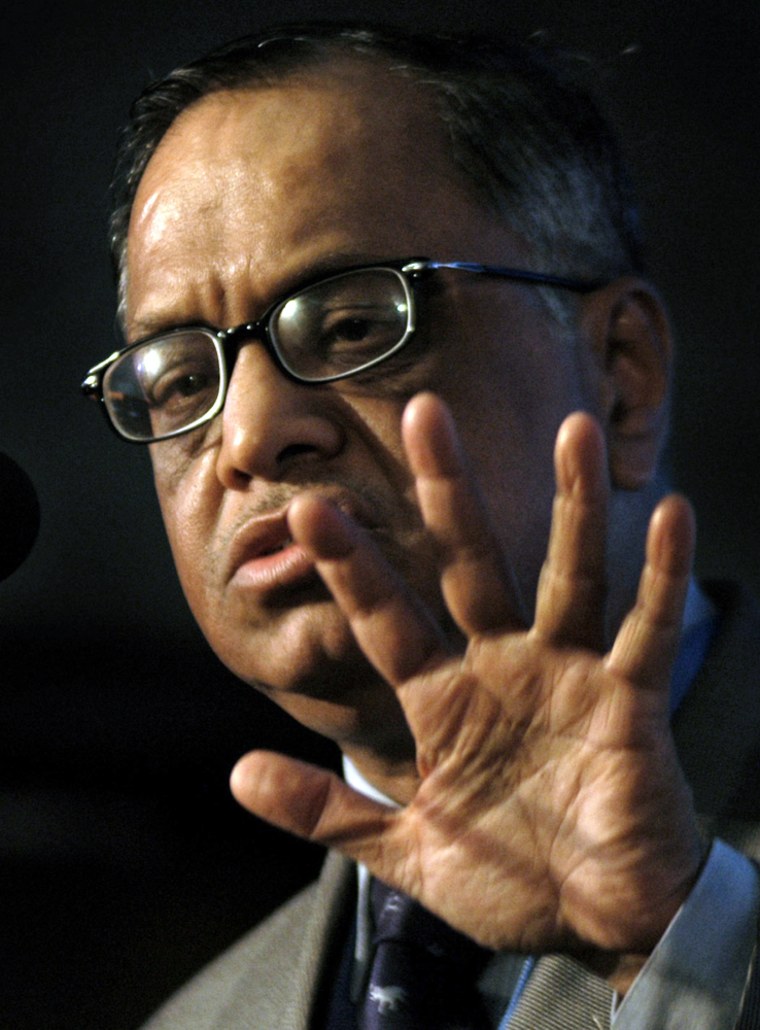Throughout his career, N.R. Narayana Murthy, founder of Infosys Technologies, has defied the customs of his native India.
He was an entrepreneur in a nation dominated by family businesses, a modest-living executive in a country where the rich are known for their excess. On Sunday, when he steps down as chairman of the company he founded 25 years ago, he’ll become that rarest species of Indian business leader — the one who gives it all up.
His reason for leaving the firm he founded says much about the man and his company — Murthy on Sunday turns 60, the mandatory retirement age at Infosys, arguably India’s first professionally run company.
While Murthy’s willingness to abide by the rules of his company would be unremarkable in the West, it is groundbreaking in India, where founders and their descendants tend to rule their creations like lords, making rules but never following them.
Murthy compared relinquishing executive power at Infosys to giving away a daughter in marriage.
“You are happy because she has grown up to be what she is, a confident youngster, that she has joined somebody with whom she finds joy, happiness and all of that,” he told The Associated Press in a recent interview. “At the same time, you remain anxious about her, you feel a sense of loss.”
He will be replaced as chairman by Nandan M. Nilekani, who is the chief executive officer and president.
Humble beginning
The son of a mathematics teacher, he and six other friends founded Infosys in 1981 with just $1,000 in startup capital.
They had spotted early the potential in the software services industry, and Infosys has since grown into an outsourcing giant with annual revenues last year of $2.15 billion. The Indian outsourcing industry Infosys helped create is now worth a total $23 billion.
Infosys also has scored a number of firsts in India. It is the country’s first global company, with more than 90 percent of its revenues coming from overseas. It was the first company here to adopt a code of corporate transparency, the first to offer stock options to employees, and the first to list shares in the United States, on the Nasdaq, in 1999.
Infosys also showed India that professionals can run a company as well, if not better, than the families, such as the Ambanis of Reliance Industries, who dominate Indian companies.
“We have raised the confidence of entrepreneurs in the country,” said Murthy, who has been among Business Week magazine’s “Stars of Asia,” and was in 2004 named one of the 10 global technology leaders by Time magazine.
“Today, no matter where you go in India, if you talk to entrepreneurs in the country, they would say, ’We want to be like Infosys,”’ Murthy said.
Murthy added that he would like, in the coming years, to see Infosys considered among the top 10 information technology companies in each of the 20 countries it operates in.
Future plans
About his own plans, he’s not so certain.
He’ll continue to mentor people at Infosys, and remains on the boards of several Indian companies. He is also a member of the prime minister’s economic advisory council and an IT adviser to several Asian governments.
The bespectacled computer engineer said he’s charmed by the idea of teaching at a university.
“There are opportunities in India and outside to go and teach at a business school,” he said. It would make him “feel young,” he added.
Indeed. He’s currently a trustee on the board of Cornell University and has ties to Harvard Business School, Yale University and the Indian Institute of Management.
He dismissed speculation about a run for public office, insisting he’s “not cut out for politics.”
What seems certain, however, is that Murthy will continue to buck the trend in India and live modestly, despite his great wealth, estimated at $1.2 billion.
Indians worth a fraction of that have servants to clean up after them, but Murthy is reputed to start each day by cleaning the toilet at his house in a middle-class neighborhood of Bangalore, India’s technology hub.
A leftist during his student days at the respected Indian Institute of Technology, Murthy believes in distributing the wealth, and stock options at Infosys have created many millionaires.
Murthy meanwhile, reportedly earned $93,000 in cash compensation last year. In contrast, his counterpart at rival Wipro Technologies Ltd., Azim Premji, got about $569,000 in cash.
As for charity, Murthy won’t discuss his good works. “You don’t do charity for publicity,” he said.
Infosys’ bylaws, meanwhile, will prevent the founders’ family members from taking over the company.
Murthy’s son Rohan, a Cornell student, “has to run his own marathon,” he said. “He should create another Infosys.”
